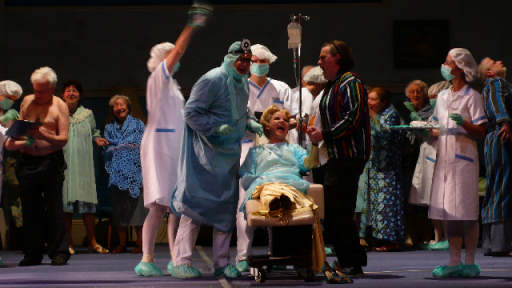Other Links
Editorial Board
-
Editor - Bill Kenny
-
Deputy Editor - Bob Briggs
Founder - Len Mullenger
Google Site Search
SEEN
AND HEARD INTERNATIONAL OPERA REVIEW
Donizetti, Don Pasquale:
New production directed by Roy Rallo, Soloists and
chorus of Deutsches Nationaltheater Weimar, orchestra
Staatskapelle Weimar, conducted by Martin Hoff.
Weimar, Germany. 31.1.2009 (MM)
For many decades the best German opera productions
have mercilessly explored the texts and subtexts of
old operas. Stories that were once innocent have
been subjected to analysis that erupts on the stage
into surprising, sometimes shocking story telling,
and at times even unexpected revelations of meaning.
Such was still the case when Weimar's new Don
Pasquale fell into the hands of American stage
director Roy Rallo.

Picture © Marsha Ginsberg
The age-old comic process of youth overcoming
obstacles placed by its elders is the crux of
Donizetti's opera. Before the inevitable
reconciliation of youth and age this story
perpetrates a complex trick that is really mean -
even its perpetrators think so, leaving us finally
somewhat ambivalent in our feelings about the new
generation. Mr. Rallo's sympathies were clearly with
the older generation. The opera ends not on the
exhilaration of youth, but on a defeated sense of
aging.
In Weimar Don Pasquale's house was an old folk's
home, populated by old folks. Real old folks.
Exploiting these folks is of course not a unique
theatrical trick, having been used in recent times
notably by Barry Kosky and Robert Carsen. In Weimar
these venerable souls expressed a collective wish for
their lost youth. Miracles were in store! Not only
could the cosmetic surgeon Dr. Malatesta transform
Norina into the sex bomb needed to stimulate
Pasquale's sexual apparatus, he could also offer the
old folks the outward appearance of their lost
youth.
American set designer Marsha Ginsberg provided an
idealized old room for the action of the opera,
idealized in the sense that it looked like a really
old real old room, one that was in its prime long,
long ago. Its walls are now a faded, pale, Easter
blue, one corner showing smoke residue from a bygone
wood stove, and old furniture where the old folks
sat, obviously scavenged from forgotten corners of
the DDR.
Costumes, the work of Doey Lüthi, were rich in detail
too, as they were surely scavenged from the piles of
garments found in second hand stores, discarded as
fashions have changed over the decades. Norina,
first a nurse in the old folks home, transformed
herself by donning a magnificent 1940's gown, then
surgically assumed gigantic tits plus lots of
platinum hair before resolving herself into a very
plain socialist matron.
Dirty tricks (of fate) abounded at the premiere.
Early in the performance a television failed to
illuminate, the missing images obviously meant to
provide crucial motivational information for the
story. Pasquale jabbed at the television remote (did
remotes exist in bygone DDR days?) triggering
extreme light cues that illuminated the love affair
of Norina and Ernesto, and left us with the
expectation that there would be some extreme light
cues at their later reconciliation. The moment was
indeed scenically set up, but any light cue was
missed.
Dirtiest of all was the last minute cancellation of
the Dr. Malatesta (attributed to a back injury
suffered from slipping on Weimar's icy streets). The
role was taken by a confident young Korean baritone,
Ji-Su Park, a member of Weimar's opera studio. Mr.
Park's presence as an aggressive young surgeon seemed
totally natural in an uncanny way (at least it worked
well for the Americans in the audience as Asians have
an important presence in American medicine). But
surely it altered the tonality of the production, as
the story telling would have been quite different if
the plot were motivated by a contemporary of
Pasquale.
Like all the more successful of German productions,
this one too relied on its strong concept to showcase
effectively the ensemble singers typical of German
repertory opera houses. Notable was Ernesto, the
fine tenor of Uwe Stickert (though those of us who
intimately know retirement homes would have made him
the maintenance man/janitor - he would have been much
easier to costume as well). The Norina of Heike
Porstein was well sung, though she was more
comfortable as the good hearted, simple nurse than as
Donizetti's strident Norina. The Don Pasquale of
bass-baritone Damon Nestor Ploumis was a fine
success. One might have wished for a larger vocal
presence but he brought subtle coloration to this
character, seemingly defeated at the end, certainly
not entirely reconciled to, and perhaps confused by
the story's outcome.
Mr. Rallo's Don Pasquale was not without its
coup de théâtre. Playing on the Italian word
Pasqua (Easter), Easter eggs appeared on stage,
Pasquale and Malatesta donned bunny masks for their
patter duet (an hysterically funny play on bunny's
mouths eating carrots). The twenty or so old folks
broke open the eggs to find photographs of
themselves, thereby discovering rebirth into the
prime of life through the miracle of photography and
the richness of memory. Thus this simple sentimental
comedy assumed profound human dimensions.
All this in spite of what came out of the pit.
Conductor Martin Hoff confused Donizetti with
Beethoven, perhaps because it was a blustery cold,
snowy night in Weimar and sunny Italy is so far away,
and the opera was sung in German anyway.
Michael Milenski
Back
to Top
Cumulative Index Page
